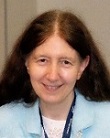
|
|
|
Keynote Speakers
Anne-Marie Caminade is Deputy Director of the Laboratoire de Chimie de Coordination (LCC-CNRS) in Toulouse since 2021, Director of Research Exceptional Class (highest grade of the CNRS) since 2014, and Head of the “Dendrimers and Heterochemistry” group since 2006.Her name is immediately associated with the field of dendrimers, in which she has been and remains the most productive person in the world. She is at the origin of the phosphorus dendrimers, on which she was able to develop at first a very important and quality fundamental research to then show the very wide extent of the applications of these species in fields as varied as catalysis (metallic or organic), materials science and biology / nanomedicine. She authored over 500 publications (h index = 76, 17700 citations), published 2 books and 55 book chapters, she is also Co-inventor of 18 priority patents of which 16 have been extended internationally, 3 patents being the basis for the creation of 2 start-ups (Dendris and IMD-Pharma). She is/was the Coordinator of several national and international projects, and is presently the Deputy Coordinator of CCIMC. She gave over 180 invited lectures in Conferences and Universities, and she was the Chair of 7 international Congresses. She is Member of the Editorial Boards of several scientific journals (Advisory Editor of Chem. Soc. Rev., IF2021 = 60.615), and frequent guest editor. She has been recently honored by the French Chemical Society with the Achille Le Bel Grand Prize in 2021, by the German Chemical Society with the Grignard – Wittig Lecture award in 2022, and by her election to the Academia Europaea in 2022.
Vincent César is CNRS senior researcher at LCC (Laboratoire de Chimie de Coordination du CNRS) in Toulouse. Vincent César studied at the Ecole Normale Supérieure de Lyon, and obtained the “Agrégation de Sciences Physiques, option chimie” in 2000. He completed his thesis in 2004 under the supervision of Prof. L. H. Gade and Dr. S. Bellemin-Laponnaz at Louis Pasteur University in Strasbourg working on chiral oxazolinyl/N-heterocyclic carbene ligands. He then joined Prof. A. Fürstner at the Max Planck Institut für Kohlenforschung in Mülheim (Germany) as an Alexander-von-Humboldt fellow. In 2006, he was appointed CNRS researcher (Chargé de recherche) at the “Laboratoire de Chimie de Coordination du CNRS” in Toulouse where he became CNRS senior researcher (Directeur de recherche) in 2020. He is manager of the group “Molecular Design of Transition Metal-Pre-Catalysts” group of the LCC and the treasurer of the Coordination Chemistry Division of the French Chemical Society. His research activities mainly concern the chemistry of N-Heterocyclic Carbenes (NHCs) for applications in organometallic chemistry, organic synthesis, and homogeneous catalysis.
Matthias Driess is a full professor of metalorganics and inorganic materials at the Department of Chemistry of the Technische Universität Berlin. He obtained his Ph.D. degree and completed his habilitation at the Ruprecht-Karls University of Heidelberg in Germany. He serves as a deputy of the Cluster of Excellence UniSysCat and is a Director of the UniSysCat-BASF SE joint lab BasCat, and of the Chemical Invention Factory (CIF) for Start-ups in Green Chemistry. He has published > 420 papers in refereed scientific journals and is a member of the German National Academy of Sciences (Leopoldina), the Berlin-Brandenburg Academy of Sciences and Humanities, and the European Academy of Sciences. His current research interests are mainly devoted to small molecule activation and homogeneous catalysis mediated by heavy main-group elements in unusual low oxidation states and a low-temperature molecular precursor approach towards nanostructured inorganic materials for thermal and electrochemical transformations of small molecules (e.g., water-splitting, selective oxygenation of organics, recycling of phosphine oxides) and chemical energy storage (green hydrogen production).
Simon Duckett is currently Director of the York Centre for Hyperpolarisation in Magnetic Resonance. He has worked on the development of an array of methods to increase the sensitivity of nuclear magnetic resonance. He was one of the earliest users of the para-hydrogen approach, and has used it to unlocked novel applications that span analysis, the probing of reactivity especially catalysis, its use in quantum computation, and contrast agent design. His SABRE method, which uses catalysis to change molecular magnetism rather than form, is being applied to many classes of organic molecule, such as amines, amides, nitrogen heterocycles, sugars, alcohols and carboxylic acids, to improve their detectability. Recently he expanded this method to provide access to the ‘hyperpharmaceutical’ in reflection of radiopharmaceuticals use in positron emission spectroscopy.
Jordi Hernando was born and grew up in Barcelona, Spain. After studying chemistry at the Universitat of Barcelona, he joined Miguel Gonzalez’s group at the same university, where he got his PhD degree in Physical Chemistry in 2000. There he applied both laser spectroscopy techniques and theoretical calculations to investigate gas-phase reactions of relevance in atmospheric chemistry. In the early 2000s he was a post-doctoral fellow at Niek van Hulst’s group at the MESA+ Institute for Nanotechnology of the Universiteit Twente, Netherlands, where he exploited single-molecule fluorescence spectroscopy techniques to study exciton dynamics in multichromophoric aggregates. Since 2004 he is a member of the “Electrochemistry, Photochemistry and Organic Reactivity” group of the Universitat Autònoma de Barcelona, where he is currently an Associate Professor. Based on his strong background in photophysics/photochemistry and nanoscience/nanotechnology, his current research interest focuses on the preparation and characterization of optically-active molecules and materials using both bulk and micro-/nanoscopic approaches. He is co-author of about 100 publications in international journals and 5 patents, has given more than 25 talks in (inter)national conferences, co-supervised 10 graduated PhD students and co-founded a spin-off company.
Luca Gonsalvi obtained a Laurea (M. Sc.) Degree in Chemistry in 1994 from the University of Parma (Italy) and a Ph.D. in Organometallic Chemistry and Catalysis in 1999 from the University of Sheffield (UK) under the supervision of Dr. A. Haynes and Prof. P. M. Maitlis. After a two-year postdoctoral stay at Delft University of Technology (NL) in the group of Prof. R. A. Sheldon and Prof. I. W. C. E. Arends, he joined CNR-ICCOM (Florence, Italy) as staff Researcher. He was then promoted to CNR Senior Researcher (2010-2020) and to CNR Research Director (from 2021). Since 2009 he is Research Unit Leader at CNR-ICCOM. He received the Italian National Habilitations as Full Professor in General and Inorganic Chemistry (2016) and in Industrial Chemistry (2019). He has participated in various national and international projects, including Marie Curie Actions and COST programmes. He was Scientific Secretary of 28-ICOMC (Florence, 2018) and NSC member of 44-ICCC (Rimini, 2022), and Sesssion Chair of many other international symposia and conferences. His research interests, centred on homogenous catalysis, include carbon dioxide activation and utilisation, hydrogen production and storage by precious and earth-abundant transition metals, organometallic chemistry and catalysis in water, study of catalytic mechanisms.
Evamarie Hey-Hawkins has been a Full Professor of Inorganic Chemistry at Leipzig University, Germany, since 1993. She received her diploma (1982) and doctoral degree (1983) at the University of Marburg, Germany. After stays at the University of Sussex, UK (1984/85), the University of Western Australia (1985/86) and the ANU, Canberra, Australia (1986/87), she completed her habilitation in Marburg (1988). From 1988-1990 she was a Research Associate at the MPI for Solid State Research, Stuttgart. In 2013, she was awarded the degree of “Distinguished Woman in Chemistry and Chemical Engineering” by IUPAC. She is also the recipient of the Elhuyar-Goldschmidt Lecture Award (2015) and the Costin Nenitzescu-Rudolf Criegee Lecture Award (2016). In 2016, the Romanian Chemical Society (SChR) honoured her with the Costin Neniţescu Medal. She received two honorary doctoral degrees, was awarded the Order of Merit of the Free State of Saxony, Germany (2017), the Leipzig University Medal (2018), the Leipzig Science Award (2019) and the prestigious Karl-Ziegler-Prize(2021) and is a member of two European Academy of Sciences (EurASc and EASA). She acts as a reviewer for several national and international research foundations and serves on several editorial and international scientific advisory boards. From 2007 to 2017, she has been the Speaker and from 2018 to 2021 she was the Vice-Speaker of the Graduate School “Building with Molecules and Nano-objects” (BuildMoNa). From 2008 to 2013, she has been the Chair of the EU-COST Action CM0802 “European Phosphorus Sciences Network” (PhoSciNet), and from 2013 to 2018, she has chaired a COST Action on “Smart Inorganic Polymers” (CM1302, SIPs). She is a member of the German Chemical Society (GDCh) since 1983 and a Fellow of the Royal Society of Chemistry (FRSC) since 1999 among other memberships. Her scientific interests are in the field of organophosphorus chemistry, biologically active boron compounds, heterometallic transition metal complexes and catalysis. More than 85 doctoral students have graduated from her group. She has authored more than 560 publications in refereed journals. Presently, she is the vice president of the German Society on Boron Neutron Capture Therapy and Chair of the Working Group on Phosphorus Chemistry under the umbrella of the German Chemical Society (GDCh).
Jason Lynam obtained his BSc and PhD from the University of York in the UK, the latter under the supervision of the late Roger Mawby. Following this, he undertook a postdoctoral position at the University of Bath with Professors Michael Green and Andrew Burrows before moving to the University of Bristol where, in 2000, he was awarded a Ramsay Memorial Fellowship. In 2002 he was appointed to a Lectureship position at the University of York, before being promoted to Senior Lecturer (2010), Reader (2018) and, from October 2022, full Professor. His research is focused on mechanistic investigations into the behaviour of transition metal complexes using experimental and computational approaches. He was a principal investigator on the team which was awarded a Royal Society of Chemistry Horizon Prize in Physical Organic Chemistry for their work using on time-resolved spectroscopy for the study of manganese-catalysed reactions.
Matthias Westerhausen obtained his diploma degree in chemistry in 1983 from the Philipps University in Marburg, Germany, and performed his Ph.D. thesis at the University of Stuttgart, Germany, under supervision of Professor Gerd Becker on acyl substituted phosphanes and arsanes. In 1987/88, he worked as a postdoctoral fellow with Professor Robert T. Paine at the University of New Mexico in Albuquerque/USA in the field of phosphanylboranes. Back at the University of Stuttgart, he finished his habilitation in the Institute of Inorganic Chemistry in December 1994 and received the venia legendi for Inorganic Chemistry in February 1995. From 1996 to 2004 he was professor at the Ludwig Maximilians University Munich where he was also vice-rector from 2001 to 2004. He obtained the teaching excellence award 1998 of the state of Bavaria. Since 2004 he is teaching and researching at the Friedrich Schiller University Jena, Germany. His main interests include the organic chemistry and catalytic applications of d0 metals with a focus on heavy Grignard reagents as well as coordination compounds of s-block metals.
Vasile I. Parvulescu received his Ph.D. in Catalysis in 1986 from the Polytechnic University of Bucharest (Romania). After one year stage in the Petroleum Company Vega-Ploiesti (Romania) he moved to the Institute of Inorganic Chemistry, Rare and Non-Ferrous Metals Bucharest (Romania) till 1991, when he joined the University of Bucharest, where became a full professor in 1999. Meantime he received several fellowships: PECO and NATO fellows, Universite Catholique de Louvain, Belgium (1993, 1996), Alexander von Humboldt, Max Planck, Muelheim, Germany (1997). He has also invited Professor of a series of Universities: Louvain-la-Neuve (Belgium), Aachen (Germany), Lille (France), Toulouse (France), Quebec (Canada), Taiwan (China), Toulouse (France), etc. He has over 30 years of experience within the field of synthesis of catalysts, catalyst characterization, asymmetric, environmental, oxidation, plasma catalysis, etc. He authored more than 420 papers, more than 26 review papers, chapters, 10 books (Wiley, RSC, Elsevier, Romanian Academy), and 31 patents. He was awarded the Prize of the Romanian Academy of Sciences and „The Grigore Moisil“ Award for exact sciences of the National Grand Lodge of Romania and was Proclaimed Knight of the National Order for Merit by the Romanian President. He serves as a President of the Romanian Catalytic Society and Secretary of the European Catalytic Society (2011-2015). At present, he is the Director of the Research Centre of Catalysis and Catalytic Processes at the University of Bucharest.
Rinaldo Poli obtained a Ph.D. degree in 1985 from Scuola Normale Superiore (Pisa, Italy) under Fausto Calderazzo, with one year also spent at Imperial College London with Geoffrey Wilkinson. After a 2-year post-doc with F. A. Cotton at Texas A&M University, he joined the faculty of the University of Maryland at College Park and rose the rank to Full Professor. In 1996, he moved to France, first to Dijon until 2003, and since then to his current position in Toulouse where he teaches at ENSIACET and carried out research at the Laboratoire de Chimie de Coordination of CNRS. His research interests are in transition metal chemistry, spanning from structure-bonding-reactivity relationships and mechanistic studies, especially for open-shell organometallic compounds, to the application of metal complexes to catalysis and to controlled radical polymerization. He has received awards from the French Chemical Society (coordination chemistry division), from the Italian Chemical Society (inorganic chemistry division and interdivisional organometallic group) and from the French Academy of Sciences (Jaffé prize, Berthelot medal). He is a Fellow of the French Chemical Society, of Chemistry Europe and of the European Academy of Sciences.
Rosa María Sebastián Pérez received her PhD in Chemistry in 1997 from the Universitat Autònoma de Barcelona (UAB) under the supervision of Prof. Marcial Moreno Mañas on the enantioselective alkylation of β-dicarbonyliccompounds and their transformation in unnatural amino acids. Then she performed a two-year post-doctoral stay at the Laboratoire de Chimie de Coordination (CNRS) in Toulouse (France) in the group of Dr. Jean Pierre Majoral and Dr. Anne Marie Caminade working in the field of macromolecules: dendrimers. Afterwards, she joined the UAB in 2000 with a Reintegration Contract for Doctors to Catalan Universities of the Generalitat de Catalunya until she earned a Ramón y Cajal position in 2001. She became permanent associate professor in 2006 and since 2020 she is Full Professor in the Organic Chemistry Section. She has been involved in the preparation of macromolecules: macrocycles, dendrimers, and polymers. The resulting molecules and their derived metal complexes or stabilized metal nanoparticles have been applied in different fields such as organometallic catalysis and organocatalysis (recovering and recycling), liquid crystals, photoisomerizable compounds, sensors, functionalization of paper or fabrics, dyes, hydrophobic materials, biocide materials, structural materials, self-healing, photothermal therapy, etc. She also collaborates with companies in the preparation of smart adhesive polymers. 14 patents have been registered from all this work and 11 of them are under exploitation by an international company. At the moment, she is vice-chancellor of innovation, transfer, and entrepreneurship at UAB.
John Slattery was awarded a PhD from the University of Bristol in 2005, supervised by Dr Chris Russell. This was followed by a post-doctoral period at the EPF Lausanne, working with Prof. Ingo Krossing, and then a Humboldt Research Fellowship at the University of Freiburg. He was appointed as a Lecturer in chemistry at the University of York in 2007, where he is currently a Reader (associate professor). His group's interests cut across the traditional inorganic and physical chemistry boundaries and have involved a range of experimental and computational studies into novel solvents, organometallic reactivity and catalysis. A particular interest has been ionic liquids and deep eutectic solvents, where in-depth studies into the liquid and interfacial structure of these liquids are providing important information that facilitate their application in catalysis.
Douglas Stephan, born in Hamilton ON, graduated with his BSc at McMaster (1976) and PhD at UWO (1980). After a NATO PDF at Harvard, he began his independent career at the University of Windsor (1982). He was promoted to Associate Professor (1985), full Professor(1992) and named a NSERC Industrial Research Chair (2001), University Professor (2002) and Canada Research Chair (2005). In 2008 he moved to the University of Toronto as a Professor and Canada Research Chair, In 2018, he was appointed University Professor. In 2020, he established an additional satellite laboratory at Ningbo University as a Zhedong Scholar Chair Professor. He was an Associated Editor for Chemical Society Reviews for 6 years, the Chair of the editorial board and is now Chair of the editorial board of Chemical Communications. A world-leading researcher in inorganic chemistry/catalysis, he is best known as the founder of the field of “frustrated Lewis pair” (FLP) chemistry. He has received a number of National and International awards, including Humboldt and Killam Fellowships. He is a Fellow of the Royal Society (London), a Corresponding Member of North-Rhein-Westfaelia Academy of the Sciences and Arts (Germany) and was a Distinguished Adjunct Professor at King Abdulaziz University, and an Einstein Visiting Fellow at TU Berlin. More recently, he was the recipient of the 2019 J. C. Polanyi Award from NSERC of Canada, a 2020 Guggenheim Fellowship the 2021 Killam Prize in Science and the 2022 F.A Cotton Award from the American Chemical Society. |















